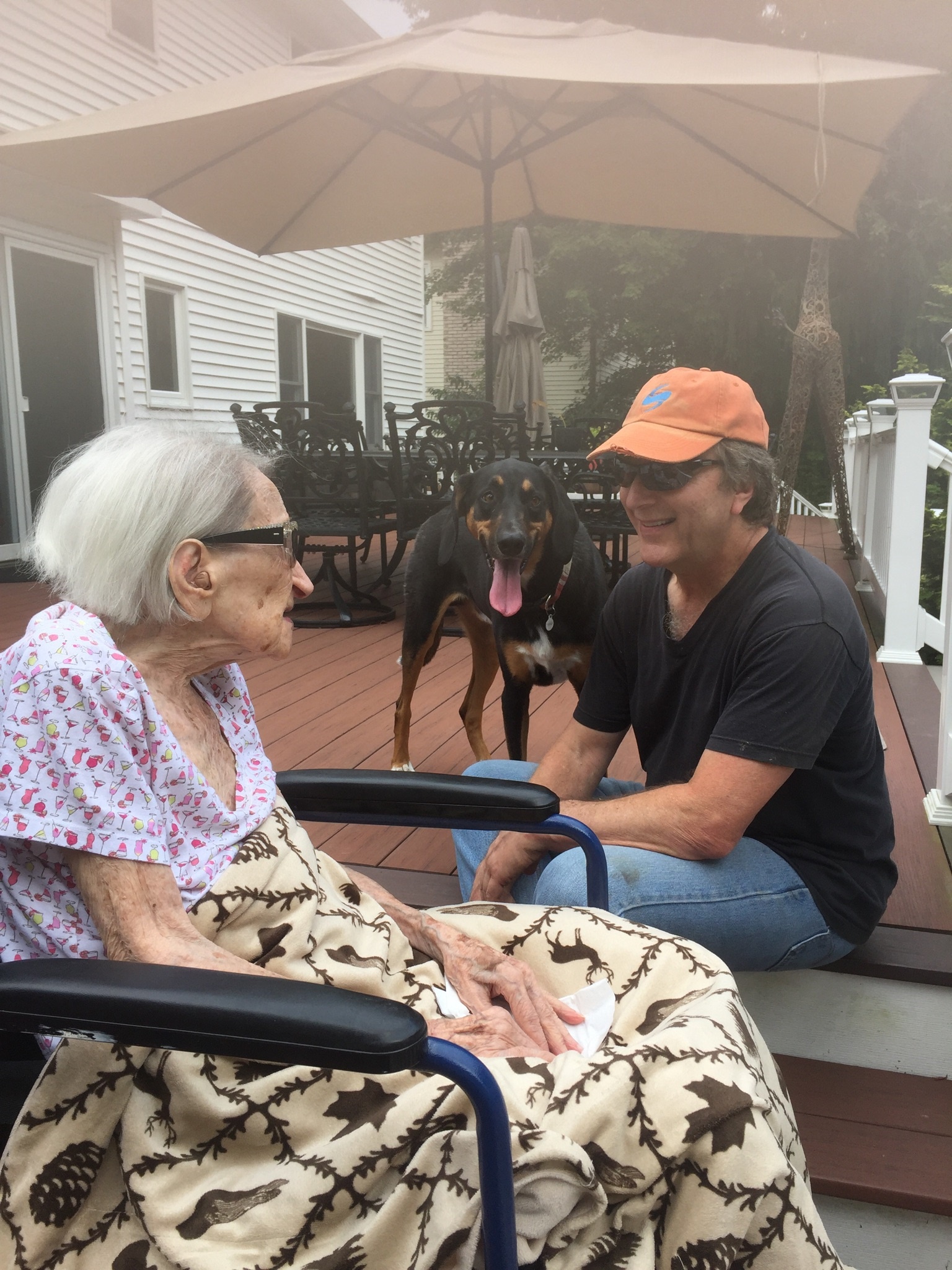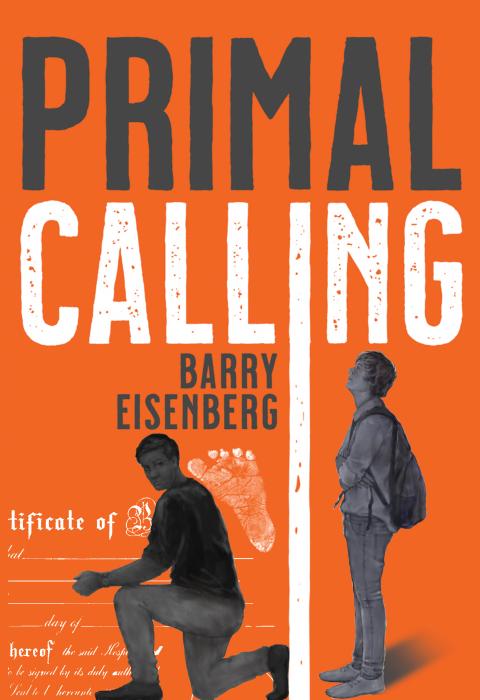Where does inspiration for a story come from?
Inspiration for a book comes in any number of ways. Sometimes from a long-held idea, other times from out of the blue. The idea for the book I’m currently writing came to me from the latter – when we brought my elderly aunt to come to live in our home at the end of her life. It crystallized both the joys and challenges of caring for an elderly loved one and opened the door to hearing similar stories from so many.
Two years ago, my aunt Doris passed away. She was just two weeks shy of her 107th birthday and had come to live with us a year and a half earlier. Always fiercely independent, Doris had resisted moving from her Manhattan apartment, where she had lived independently for over 70 years. She finally relented because, as she put it, her body “was betraying her.”
By the time she agreed to come live with us, Doris had grown terribly frail. I worried she wouldn’t survive the ambulette trip to our New Jersey home. Her death seemed imminent, and my wife, Amy, and I wanted to provide her with a peaceful experience at the end of her life, surrounded by family.
.jpg)
at her 90th birthday party in 2002
That time in the ambulette hit me hard. Doris seemed to be hovering somewhere between life and death. Her eyes were vacant. They had always reminded me of my dad’s – her brother – rekindling the feelings of loss I felt with his passing fifteen years earlier. Their eye color was an identical and distinct shade of brown. But while his were soft and welcoming, hers were always in a perpetual slight squint, as though she was judging. At that moment in the ambulette, I wanted to feel that my emotions were directed exclusively to her. But they kept drifting back to missing him.
Doris made it to our house. She was only mildly responsive and quite confused in the first couple of days. But she was alive. On the third day, she mumbled a few words. And then, much to our astonishment, she began a slow but steady transition to relative health and well-being. After a few weeks, she even regained her ability to walk.
Her mind came fully back as well. She loved sharing stories of her early childhood in Poland, like baking with her mother, my grandmother. She was seven years old when she and my grandmother came to the U.S.; my grandfather had come years earlier to find work. She still clearly remembered the pain of hunger on the boat over to America. A hundred years later, that memory still haunted her.
As a young adult, Doris worked her way up the corporate ladder in a finance company. It was inspiring to hear her proudly recounting her work as the only female member of the executive team… in the 1950s!
I wrote about our time with Doris in The New York Times. The response to the article was unexpected and overwhelming. Many described as unanticipated the enriching experience of caring for an elderly relative. Sometimes it meant making room in their home for a parent who could no longer live on their own. Sometimes it meant committing to more frequent visits. Sometimes it meant creating time for meaningful conversation about common interests. There’s no one right way.
But many also shared struggles and strains. For some, it was grueling to watch a parent decline mentally and/or physically. “Am I doing enough?” many wondered, some finding it impossible to quell their second guessing, impossible to find liberation from self-doubt. For others, family conflicts arose when the care and attention needed by an elderly parent clashed with the time and attention desired by a spouse or children.
As I read the accounts – from those experiencing joy to those feeling guilt or anguish – I found myself reflecting on my own sense of loss more fully. Ten years ago, my brother and sister passed away within four months of one another. My mother outlived them by four years. I, too, asked myself, “Did I do enough?” Was the devotion to Doris a way of compensating for where I felt I might have fallen short elsewhere?
How we choose to care for an elderly relative may sometimes be straightforward, but more often it is bound by complications. The stories others shared with me inspired the novel I am currently writing. It centers on a family navigating the wrenching decisions about how to best care for the husband’s aging mother. At 85, she’s showing signs of losing her capacity to live independently, like reaching for the wrong medication, slipping as she takes cookies from the oven, forgetting her doctor’s name. His wife is firm about not wanting her mother-in-law to come live with them. The family dynamic extends to the grown children who are wrapped up in the emotional jumble. They are concerned about their grandmother while not wanting their own time and freedom compromised by her needs, and they’re distressed over their parents’ conflict.
Though the book is not about COVID, it’s impossible to write without being affected by what is happening in the world around us. Last week, my friend Susan told me that her 82-year-old mother, a resident in an assisted living facility, needed heart surgery. Fortunately, the surgery was a tried-and-true procedure to repair a minor leak in a heart valve. But of course, surgery is surgery and not without risk for an 82-year-old, so anxieties ran high.
Susan’s mother was also in the early throes of dementia, which, the family feared, would make the period following surgery difficult since she might not understand or remember the instructions for things like medication use and diet. Because of COVID, Susan has not been able to visit her mother since last March. An ambulance had taken her to the hospital. Susan and her sister briefly lowered their masks so their mom would more easily recognize them, and they feigned cheerful optimism as they waved to her from the hospital sidewalk as she entered the hospital. They felt helpless. And horrible.
I have heard story after story just like this over the past year, the often agonizing loneliness of older people, their contact with loved ones confined to devices, like cell phones and tablets, frequently difficult for them to operate.

I often wonder what would have happened had Doris’ lapse into frailty occurred today. Would it even have been possible for her to come live with us? We’ll never know. For so many, and maybe the elderly most of all, making up for what has been lost in these dark times is especially grievous. Of the many things I am grateful for, it is that Doris’ decline occurred when we could do something about it. Today, too many don’t have the luxury of making such choices.
Caring for Doris was a joy. Amy and I learned much about her – not just the facts of her life that we had been unaware of, but how she saw herself and felt about her life. We came to believe that the squint in her eyes was less a sign of being judgmental, but her way of preventing people from getting too close.
Yet, it’s also possible I had it all wrong. At one point I asked her what accounted for her longevity. I expected her to say something along the lines of persevering through adversity. But she said, “I always look up.” She then added that “by looking at the sky, possibilities seem endless.” Could her squint have also been a reaction to the sun, a byproduct of the optimism she strove to project?
Doris’ eyes were relaxed at the end. Maybe all the possibilities she dreamed of had finally come to her. Or maybe she was just at peace. I could still see my father’s eyes in hers. And while I miss him terribly, I miss Doris, too. All on her own.
When we emerge from the nightmare of the pandemic, a renewed appreciation for the wonder of life may guide us as we think about how to give our elderly loved ones the gift of connection.

